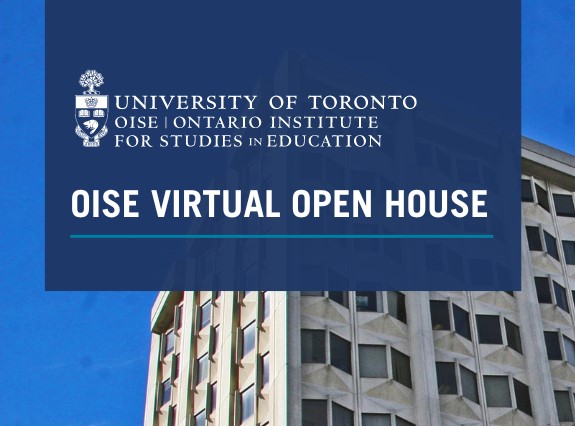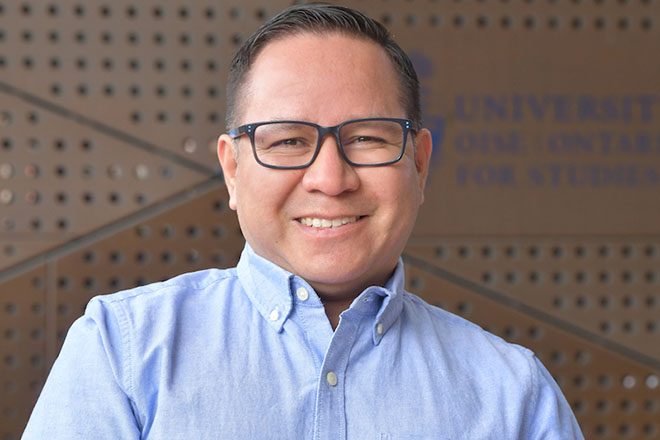Master of Arts in Language & Literacies Education

Master of Arts in Language & Literacies Education Overview
The Language & Literacies Education Program investigates questions about the relationships of literacies in language and language in literacies across communities, societies, instructional environments, and informal learning settings.
Language & Literacies courses address current issues in the study of applied linguistics and literacies, such as:
- The learning, teaching, and use of Indigenous, official, international/heritage, and sign languages and literacies;
- Curriculum, instruction, and assessment related to the development of first and additional language and K-12 literacy skills;
- The development of bilingual, multilingual, and translinguistic abilities;
- Language and literacy education policies and planning;
- Pedagogy oriented on multiliteracies development, including early literacy and adolescent reading, writing and oral language development, and children’s literature across the curriculum;
- Social justice issues related to plurilingualism and cultural and linguistic diversity; and
- Pedagogical implications of the fact that language and literacy are infused into all aspects of learning in contexts characterized by linguistic diversity.
Students enrolled in the Language & Literacies Education MA program are required to complete eight half-courses and a thesis. Additional coursework may be required depending on previous experience and academic qualifications.
At a Glance
Study Options
Full-time (6 sessions)
Part-time (10 sessions)
Coursework (8 half courses) + Thesis
Funding and Tuition
For current information about tuition fees, funding, and financial support, visit Tuition & Financial Support.
Application Deadline
To view current application deadlines, visit the OISE application deadlines and closing dates page.

Apply
Ready to join one of the world’s top universities? Take the next step in your academic journey and start your application to graduate studies at OISE.
Speak with our Team
Have questions about our program, admissions, financial support or career options after graduation? Our team has the answer you’re looking for. Contact us for one-on-one support.
Attend an Info Session
We host information sessions, open houses and tours throughout the year. Come discover what it's like to study at OISE. Explore campus and meet our community.
LLE Admissions Drop-In
Have a question about admissions requirements?
Email us at ctladmissions.oise@utoronto.ca
Drop-in (online) and speak to program staff.
Every Thursday from 12:00 p.m. to 1:00 p.m. (EST)
Why I Chose Curriculum, Teaching & Learning

Yecid Ortega (Master of Arts 2015, Doctor of Philosophy 2021)
Lecturer and Research Assistant
Language, Literacies and Comparative International and Development Education
"My journey has taken me from teaching English as a Foreign Language in Colombia to the USA where I worked as a Spanish teacher, teacher educator and curriculum developer for various schools and now to Canada – where I have found my home in research and education in teacher education programs and TESOL. At OISE, I explore issues of social justice in language teacher education and culture, race, linguistics, human rights, and gender equality around the world."
Master of Arts in Language & Literacies Education Admission Requirements
General Admission Requirements
Please visit the OISE Admissions website for detailed information about the application process, including general minimum admission requirements and supporting documents.
Program-Specific Information (Minimum Admission Requirements)
Minimum admission requirements for this program are:
- An appropriate honours bachelor’s degree (4-year) or equivalent with standing equivalent to a University of Toronto mid-B or better in the final year or over senior courses.
- English Language Proficiency (if required)
- Please see the SGS calendar for more details.
We encourage equity-seeking groups to identify themselves in their application.
Required Supporting Documents
All applicants must submit:
- Online Application
- Transcript(s) from each post-secondary institution attended
- Two letters of reference from two separate people (one academic and one professional)
- A resumé that provides clear and complete information about the applicant's work or field experience related to their proposed studies
- Completion of program application questions (ie. "Faculty Questions: CTL" below)
- In 1,000-1,500 words, describe why you wish to undertake a research-oriented program in Language & Literacies Education. Discuss your academic interests, experience and professional concerns. We ask each applicant to:
- Highlight research activities in which you've engaged (e.g., action research in your classroom, work as a research assistant on a funded research project). Discuss how you will build on these experiences or what you have learned that will inform your graduate work.
- Write about professional experiences (teaching and those related to education), as well as contributions to education (e.g., involvement in curriculum-writing teams, mentoring new teachers), and discuss how you will build on these experiences in your graduate work.
- Discuss any relevant publications you have.
- Identify potential research topics for your thesis, providing background information on why these topics are important to you. You may want to sketch out a potential research project to give reviewers a sense of your command of a particular topic, relevant literature, and how you would design a study of it.
- Please review the CTL faculty research information. If you identify Language & Literacies Education faculty members whose research align with yours, you will be asked to list only their first names and last names.
- Based on what your described program of study, list 3-5 keywords to describe your research interests.
- If you will have funding from your home government, international organizations or funding agencies, please provide details (Name of funding agency, value and duration). If this does not apply, this section will remain blank.
- Is there any additional information you would like to share with the Admissions Committee that will inform their review of your application?
- In 1,000-1,500 words, describe why you wish to undertake a research-oriented program in Language & Literacies Education. Discuss your academic interests, experience and professional concerns. We ask each applicant to:
- View FAQ for other important application notes.
Additional Degree Information
We are looking for applicants who have a sound academic background and a deep interest in education. Our degree is designed to provide opportunities for study, research, and theoretical analysis. It attracts a wide range of educational professionals, including teachers, health workers, community-based educators, educational activists, school board administrators, post-secondary faculty, individuals in corporate and not-for-profit industries, and people in other education-related fields.
Applicants should have demonstrated commitment to education prior to applying. Please note, the Master of Arts program is not a teacher certification program. For more information on our teacher certification programs please visit: OISE Teacher Education Degrees.
The Language & Literacies Education program is designed for flexibility. Choose courses that best meet your needs. The program details are as follows:
-
The LLE MA degree normally requires eight completed courses and a Masters thesis. Additional courses may be required of some candidates.
-
Students are required to successfully complete CTL3001H – Research Colloquium in Language and Literacies Education and a course in research methods from the LLE approved research methods course list.
-
At least four of the courses must be Language & Literacies Education courses. LLE courses are identified with CTL3000-level course codes (i.e CTL3000H to CTL3999H) and Special Topics courses in LLE are identified as CTL5300H to CTL5699H (Masters Level) and CTL6300H to CTL6999H (Doctoral Level). The remaining courses are electives. The remaining courses are electives.
-
Non-LLE courses (if you choose to take them) can include Masters-level courses from the Curriculum & Pedagogy program or courses from any other OISE departments: Social Justice Education, Applied Psychology & Human Development, and Leadership, Higher, and Adult Education.
The LLE MA Program offers a wide variety of courses. Our classes typically consist of 15 to 25 students.
The LLE MA can be taken on a full-time or part-time basis. Full-time students are required to take at least two couses (or maximum of three) in the fall session and at least two courses (or a maximum of three) in the winter session. Part-time students may take a maximum of one course per session. A typical course involves 12 classes. During the fall and winter session, a class will meet once each week. The summer session has a first term (May to June) and a second term (July to August), during which time if you choose to take courses, classes meet twice a week for six weeks per term. Classes are normally scheduled for the early evening (e.g., 5pm to 8pm) or the early afternoon (e.g., 1pm to 4pm), Monday through Thursday. We also offer a selection of online courses. Enrolment in all courses are on a first-come, first-served basis.
Interested in interdisciplinary study?
UofT offers collaborative specializations which involve the cooperation of two or more graduate units (i.e. departments, programs, or centres). Students admitted to LLE have the opportunity to discover the research possibilities available with the following collaborative programs:
Regrettably, our Full-Time Funded Master of Arts program cannot accept International applicants at this time.
Such applicants are invited to apply to the Part-Time Master of Arts program or the Master of Education (Full-Time or Part-Time) program. Any international applications for the Full-Time MA program will automatically be redirected to the Full-Time M.Ed. program for consideration.
For more on international student admissions please review International Applicants on the OISE Registrar's office website.
- SGS Guide to Supervision
- OISE's oral examination guidelines
- The Role of the Literature Review
- The Qualitative Dissertation Proposal (Article by Professor Emeritus Brent Kilbourn)
- Student to Scholar Research Modules
The following is the result of a question and answer (Q&A) discussion which took place following a LLE Open House presentation.
Is there a part-time option for this program?
Yes, students can choose part-time or full-time registration status and choose maximum course load based on your registration status. See the OISE Registrar's Office & Student Experience (ROSE) for maximum course load.
How do students find a thesis supervisor?
At the point of admission successful applicants to the LLE MA are assigned a Faculty Advisor whom you can speak with if you have questions regarding program requirements, course selection etc. Your Faculty Advisor will often become your Thesis Supervisor, however if you find that your academic interests necessitate that you work with a different faculty member as thesis supervisor, your faculty advisor will help you to find an appropriate faculty member to take on that role.
What should I include in my resumé?
Your resumé should describe your education history (both academic and professional), research experience, employment history (including names of employers, job titles, position responsibilities, dates employed, whether full- or part-time), awards, business and professional achievements, community activities, as well as any special skills.
If unable to provide an academic reference, would two professional ones work instead?
While a minimum of two letters of reference – one academic and one professional – should be included in your application, sometimes applicants experience difficulty obtaining a letter of reference. For example, if you graduated many years ago and have since not been active in an academic setting you may be unable to call upon a university instructor with whom you studied. You're strongly encouraged to obtain one academic and one professional letter of reference, but you may submit an alternative combination such as two reference letters from a professional source. Tip: for two professional letters direct the most suitable referee to include comments pertaining to your intellectual abilities and potential.
Can you switch to Part-Time or Full-Time half way?
Yes, you can request to change your registration status from Part-Time to Full-Time or Full-Time to Part-Time. MA Part-Time students who wish to change to Full-Time may only request the change after completing the first year of study. You must contact your Registration Specialist in the OISE Registrar's Office & Student Experience (ROSE) and make the request to change your registration status. Please keep in mind that changing your registration status will affect your registration fees; contact your Registration Specialist of details: oise.registration@utoronto.ca.
Can I complete the MA at a distance?
You can do that. Although not guaranteed, there are normally enough courses available online to complete the degree.
What are collaborative specializations?
Collaborative Specialization programs are created by participating graduate units to explore a novel interdisciplinary area or special development that crosses a number of disciplines. If you are admitted into a graduate program that participates in a collaborative specialization; many of which are actually University of Toronto wide specializations to which CTL is very closely connected; you can apply to a collaborative specialization, but you need to apply to them directly. If you review our website, and websites of affiliated collaborative specializations, you’ll see LLE participates in a number of collaborative specializations.
I have a question about language proficiency. I’ve been working as an occasional teacher for four years here, but finished education outside of Canada. Do I still need to prove language proficiency?
As English is the primary language of instruction and communication at the University of Toronto, applicants must demonstrate an adequate level of proficiency in English, regardless of their citizenship status or country of origin. It is important that these students follow School of Graduate Studies (SGS) policies on English Language Proficiency (ELP) testing requirements and take one of the required tests for admission to a graduate program. Applicants from universities outside Canada where English is not the primary language of instruction must provide results of an English language proficiency examination as part of their application. Tests must have been taken within the last 24 months at the time of submission of their application.
The determination of whether an English language proficiency test is required is determined by the admissions division of the OISE Registrar's Office & Student Experience (ROSE), but only after the application has been submitted. Visit the SGS webpage on English language proficiency for more information.
What is the difference between Masters of Teaching degree and the LLE MA?
The Master of Teaching is actually a different program. That is our teaching program which offers a master's degree and Ontario Teaching Certification for classroom teaching. This is a program where if you wanted to go into teaching as a career you would pursue a master's degree there. That is not an option in our Language & Literacies in Education program.
What happens after I submit my applications?
Once you've completed your application, understand what happens next by visiting After Submitting Your Application.
I was offered admission, what are my next steps?
Applicants who receive an official "Offer of Admission" result letter can view the Newly Admitted Students webpage for information on next steps.
Ready to join one of the world’s top universities?
Take the next step in your academic journey and start your application to graduate studies at OISE.